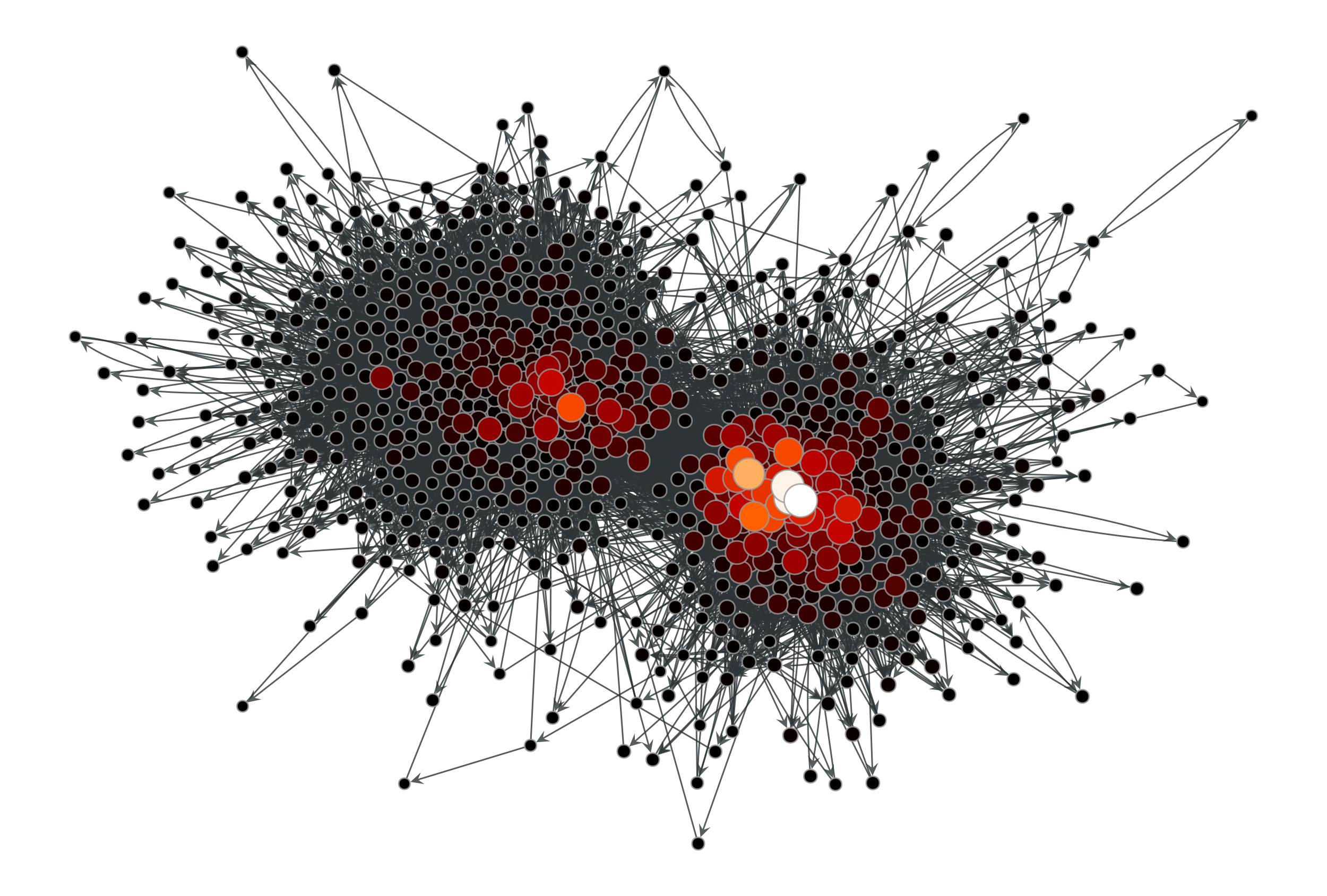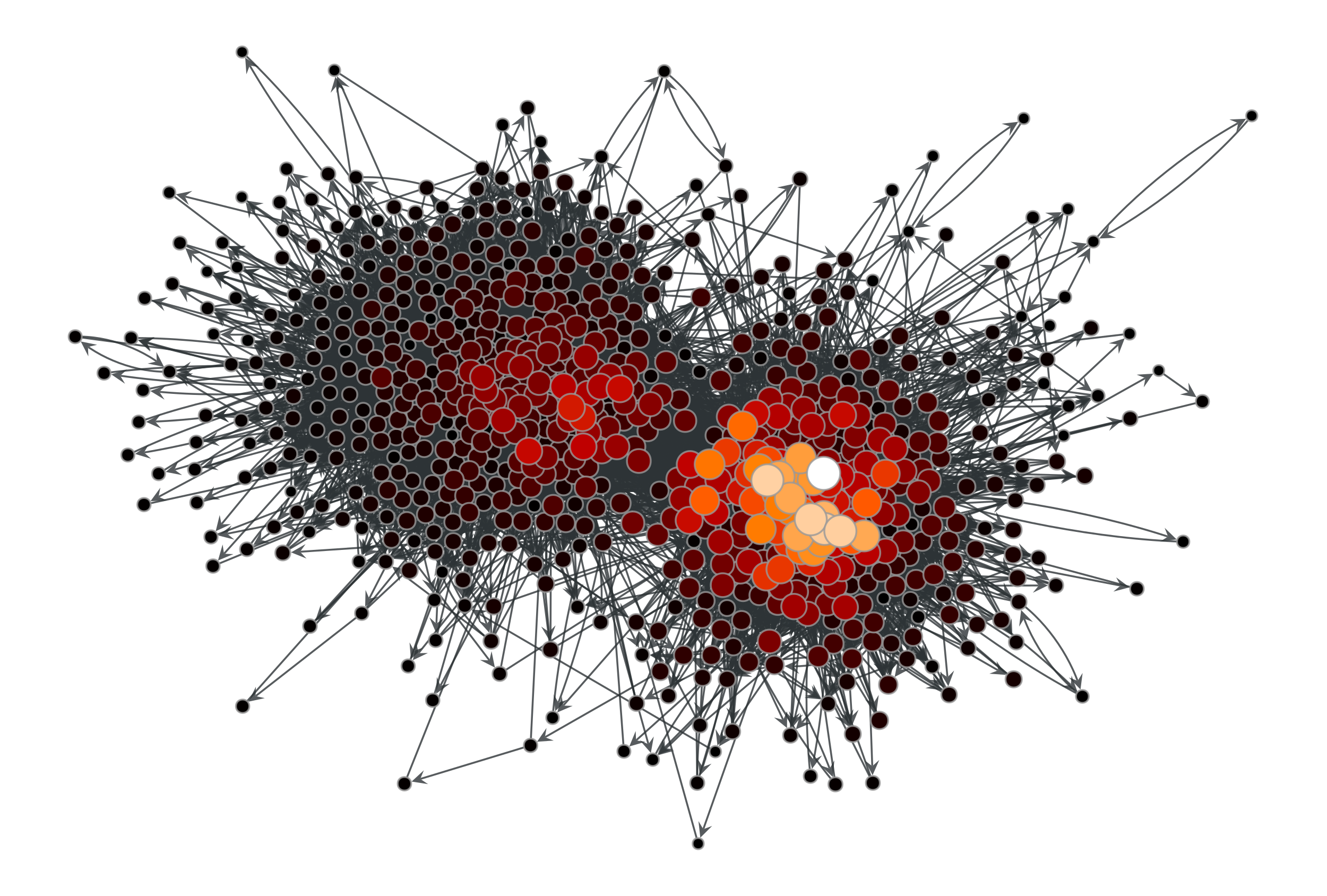hits#
- graph_tool.centrality.hits(g, weight=None, xprop=None, yprop=None, epsilon=1e-06, max_iter=None)[source]#
Calculate the authority and hub centralities of each vertex in the graph.
- Parameters:
- g
Graph Graph to be used.
- weight
EdgePropertyMap(optional, default:None) Edge property map with the edge weights.
- xprop
VertexPropertyMap, optional (default:None) Vertex property map where the authority centrality must be stored.
- yprop
VertexPropertyMap, optional (default:None) Vertex property map where the hub centrality must be stored.
- epsilonfloat, optional (default:
1e-6) Convergence condition. The iteration will stop if the total delta of all vertices are below this value.
- max_iterint, optional (default:
None) If supplied, this will limit the total number of iterations.
- g
- Returns:
- eigfloat
The largest eigenvalue of the cocitation matrix.
- x
VertexPropertyMap A vertex property map containing the authority centrality values.
- y
VertexPropertyMap A vertex property map containing the hub centrality values.
See also
betweennessbetweenness centrality
eigenvectoreigenvector centrality
pagerankPageRank centrality
trust_transitivitypervasive trust transitivity
Notes
The Hyperlink-Induced Topic Search (HITS) centrality assigns hub (\(\mathbf{y}\)) and authority (\(\mathbf{x}\)) centralities to the vertices, following:
\[\begin{split}\begin{align} \mathbf{x} &= \alpha\mathbf{A}\mathbf{y} \\ \mathbf{y} &= \beta\mathbf{A}^T\mathbf{x} \end{align}\end{split}\]where \(\mathbf{A}\) is the (weighted) adjacency matrix and \(\lambda = 1/(\alpha\beta)\) is the largest eigenvalue of the cocitation matrix, \(\mathbf{A}\mathbf{A}^T\). (Without loss of generality, we set \(\beta=1\) in the algorithm.)
The algorithm uses the power method which has a topology-dependent complexity of \(O\left(N\times\frac{-\log\epsilon}{\log|\lambda_1/\lambda_2|}\right)\), where \(N\) is the number of vertices, \(\epsilon\) is the
epsilonparameter, and \(\lambda_1\) and \(\lambda_2\) are the largest and second largest eigenvalues of the (weighted) cocitation matrix, respectively.Parallel implementation.
If enabled during compilation, this algorithm will run in parallel using OpenMP. See the parallel algorithms section for information about how to control several aspects of parallelization.
References
[hits-algorithm][kleinberg-authoritative]J. Kleinberg, “Authoritative sources in a hyperlinked environment”, Journal of the ACM 46 (5): 604-632, 1999, DOI: 10.1145/324133.324140 [sci-hub, @tor].
[power-method][adamic-polblogs] (1,2)L. A. Adamic and N. Glance, “The political blogosphere and the 2004 US Election”, in Proceedings of the WWW-2005 Workshop on the Weblogging Ecosystem (2005). DOI: 10.1145/1134271.1134277 [sci-hub, @tor]
Examples
>>> g = gt.collection.data["polblogs"] >>> g = gt.GraphView(g, vfilt=gt.label_largest_component(g)) >>> ee, x, y = gt.hits(g) >>> gt.graph_draw(g, pos=g.vp["pos"], vertex_fill_color=x, ... vertex_size=gt.prop_to_size(x, mi=5, ma=15), ... vcmap=matplotlib.cm.gist_heat, ... vorder=x, output="polblogs_hits_auths.pdf") <...> >>> gt.graph_draw(g, pos=g.vp["pos"], vertex_fill_color=y, ... vertex_size=gt.prop_to_size(y, mi=5, ma=15), ... vcmap=matplotlib.cm.gist_heat, ... vorder=y, output="polblogs_hits_hubs.pdf") <...>

HITS authority values of the a political blogs network of [adamic-polblogs].#

HITS hub values of the a political blogs network of [adamic-polblogs].#